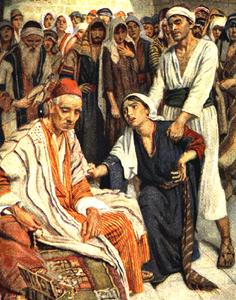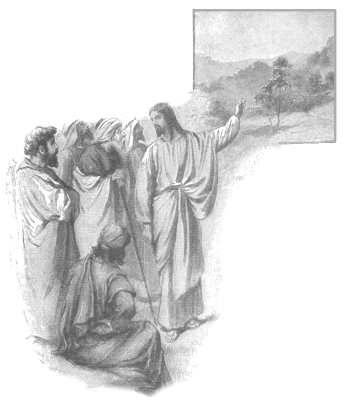google-site-verification: google85f203565cb16b4c.html
Making Better Thought-Movies One Truth At A Time
_________________________________
The Parable of the
Importunate Widow

Importunate = "persistent"
The judge couldn't escape her..."she just won't stop" until I render a decision in her claim!
Luke 18.1-8
Parable of the Persistent Widow
18 One day Jesus told his disciples a story to show that they should always pray and never give up.
2 “There was a judge in a certain city,” he said, “who neither feared God nor cared about people.
3 A widow of that city came to him repeatedly, saying, ‘Give me justice in this dispute with my enemy.’
4 The judge ignored her for a while, but finally he said to himself, ‘I don’t fear God or care about people,
5 but this woman is driving me crazy. I’m going to see that she gets justice, because she is wearing me out with her constant requests!’”
6 Then the Lord said, “Learn a lesson from this unjust judge.
7 Even he rendered a just decision in the end. So don’t you think God will surely give justice to his chosen people who cry out to him day and night? Will he keep putting them off?
8 I tell you, he will grant justice to them quickly! But when the Son of Man returns, how many will he find on the earth who have faith?”
|
The Parable of the Persistent Widow:
|
 |

|
Parables are powerful "word-pictures" that are meant to be engrafted into our thinking...as mental pictures do control our thought-life. That's where the "imagination" gets involved. The imagination allows mental exploration of the past, present, future. It is the ability to see pictures and images in the "movie theater" of the mind. The imagination is the "workshop" of the human mind. It is the only thing in the world we have complete control over. That's why GOD takes great interest of what goes on there, and judges what we allow to grow there - Genesis 6.5 |
  |
Mark 12.40-44 " Yet they shamelessly cheat widows out of their property and then pretend to be pious by making long prayers in public. Because of this, they will be more severely punished.” The Widow’s Offering 41 Jesus sat down near the collection box in the Temple and watched as the crowds dropped in their money. Many rich people put in large amounts. 42 Then a poor widow came and dropped in two small coins.[a]
43 Jesus called his disciples to him and said, “I tell you the truth, this poor widow has given more than all the others who are making contributions. 44 For they gave a tiny part of their surplus, but she, poor as she is, has given everything she had to live on.” |

Did the importunate widow want "revenge?"
Isaiah 1.23 "Your leaders are rebels, the companions of thieves.
All of them love bribes and demand payoffs, but they refuse to defend the cause of orphans or fight for the rights of widows."
Job 22.9 "You must have sent widows away empty-handed and crushed the hopes of orphans."
Malachi 3.5 "At that time I will put you on trial. I am eager to witness against all sorcerers and adulterers and liars. I will speak against those who cheat employees of their wages, who oppress widows and orphans, or who deprive the foreigners living among you of justice, for these people do not fear me,” says the Lord of Heaven’s Armies."
- The importunate widow sought to be "avenged" - not "revenged"
"Avenge" traditionally relates not only to repaying a wrong but to getting justice on somebody else's behalf as a remedy for that wrong.
"Revenge" traditionally relates to getting even with an adversary by inflicting punishment or harm.
The importunate widow was not trying to inflict "punishment" - she just wanted a remedy for being wronged... BIG difference!
Making Better Thought-Movies One Truth At A Time
_________________________________
Bible Study Lessons
- Abandonment
- Abilities
- Abortion
- Abuse
- Addiction
- Accusations
- Adultery
- Anger
- Apathy
- Ashamed
- Attitudes
- Backsliding
- Betrayal
- Bitterness
- Born Again
- Chance
- Conscience
- Deceit
- Deception
- Discipline
- Discretion
- Eyes of GOD
- False Witness
- Fear of the Lord
- Fear -Lord #2
- Flattery
- Friendship
- Fool, A
- Foolishness
- Forgiveness
- Giving
- Inheritance
- Injustice
- Instruction
- Judgment
- Kindness
- Knowledge
- Lawlessness
- Lies, Lying
- Misunderstand
- Pleasure
- Pride
- Problems
- Soft Answers
- Speech
- Understanding
- Vengeance
- Wisdom

Parables by Jesus
- Children of Bridechamber
- New Patch, Old Garment
- New Wine, Old Wineskins
- Treasures Old and New
- Spontaneous Growth
- Mustard Seed
- The Leaven
- Hidden Treasure
- Pearl of Great Price
- Dragnet
- The Soils
- Children at Play
- Wise and Foolish Builders
- The Wheat and the Tares
- Empty House
- Uncompleted Tower
- Rash King's Warfare
- Chief Seats
- Pharisee and Publican
- Two Debtors
- Unmerciful Servant
- Barren Fig Tree
- Bond Servant
- Unjust Steward
- Rich Fool
- Rich Man and Beggar
- Good Samaritan
- Laborers and the Hours
- Friend at Midnight
- Importunate Widow
- Lost Sheep
- Lost Coin
- Prodigal Son
- Elder Brother
- Two Sons
- Cruel Vine-Dressers
- Rejected Cornerstone
- Great Feast
- Wedding Robe
- Wise and Foolish Virgins
- Talents
- Good Shepherd